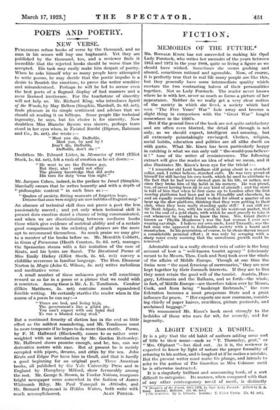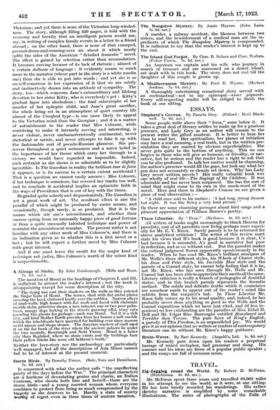A LIGHT UNDER A BUSHEL.
IT is a pity that the old habit of authors adding some sort of title to their name—such as " T. Thorneley, gent," or " Mrs. Oliphant "—has died out. As it is, the reviewer is expected to know by light of nature the proper formality of referring to his author, and is laughed at if he makes a mistake. But the present writer must make his plunge, and intends to refer to the author of The Guardian as Miss Colmore until he is otherwise instructed.
It is a singularly brilliant and unassuming book, of a sort difficult to categorize. Its manner, when compared with that of any other contemporary novel of merit, is distinctly
• Memories of the Future, 1515-1972. by Ora' Lady Pordock. Edited by It. A. Room. Landon : Methuen. &U. id. net.] t The Guardian. By U. Cobuoro. London : T. rialer 173. 6d. net.l
Victorian; and yet there is none of the Victorian long-winded- ness. The story, although filling 820 pages, is told with the economy and brevity that an intelligent person would use, say, in writing of complex family events in a letter to a friend abroad ; on the other hand, there is none of that cramped, pressed-down-and-running-over air about it which nearly splits the sides of the American " detailed domestic " novel.
The effect is gained by selection rather than accumulation. It becomes moving because of its lack of rhetoric ; almost of a certain dullness of language : it evidently means so much more to the narrator (whose part in the story is a white muslin
one) than she is able to put into words ; and yet she is so un-self-conscious in her expression of it that we are subtly and instinctively drawn into an attitude of sympathy. The story, too—which concerns Jane's extraordinary and lifelong devotion to her sister Kitty, who is everybody's pet : Kitty's gradual lapse into alcoholism : the final catastrophe of her
murder of her epileptic child, and Jane's great sacrifice, the whole being set in an atmosphere of quiet country life almost of the Cranford type—is one more likely to appeal
to the Victorian mind than the Georgian ; and it is a matter of astonishment to the reader that Miss Colmore, while contriving to snake it intensely moving and interesting, is never violent, never uncharacteristically sentimental, never rhetorical or satiric, and never attempts to fake it up with the fashionable sort of pseudo-Russian glamour. She pre- serves throughout a quiet seriousness and a naive belief in the importance of her theme which carry her through to a victory we would have regarded as impossible. Indeed,
such restraint as she shows is so admirable as to be slightly incredible. Is The Guardian in reality the brilliant tour de force it appears, or is its success to a certain extent accidental ? That is a question we cannot easily answer : Miss Colmore,
if her technique is conscious, has covered her tracks too well, and to conclude it accidental implies an optimistic faith in the ways of Providence that is out of key with the times.
Regarded quite soberly and dispassionately, The Guardian is not a great work of art. The resultant effect is 4one the parallel of which might be produced by easier means, and
occasionally, though rarely, is so produced. But it is the means which stir one's astonishment, and whether their success spring from an unusually happy piece of good fortune or from a quite unusually talented technique and power of restraint the astonishment remains. The present writer is not familiar with any other work of Miss Cohnore's, and there is no indication given as to whether this is a first novel or a last ; but he will expect a further novel by Miss Colmore with great interest.
And if one must leave the credit for the major kind of technique sub judice, Miss Colmore's worth of the minor kind
is unquestionable.











































 Previous page
Previous page